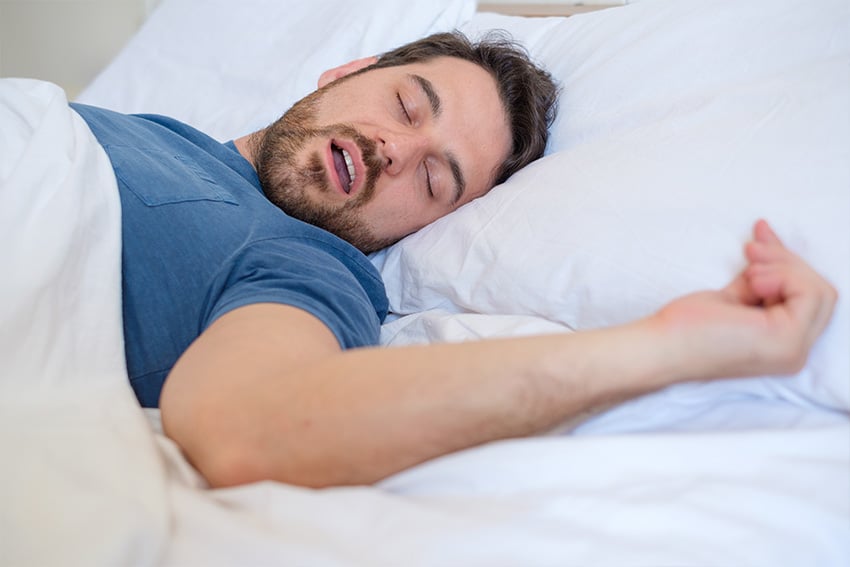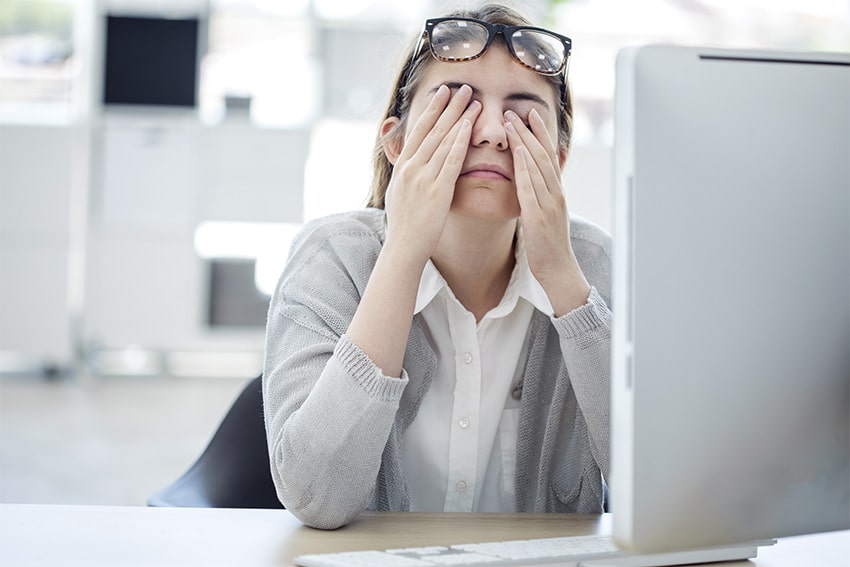Sleep apnea is currently one of the largest health problems in the US. Currently, it’s estimated that 22 million Americans have sleep apnea, but only 20% of these cases are diagnosed. Of those with a diagnosis, not all of them use treatment as instructed by their physicians. The National Commission on Sleep Disorders reports that 38,000 people die every year from cardiovascular problems related to sleep apnea.
So how do you know you have sleep apnea? The only way to know for sure is by taking a sleep test. However, there are seven major signs that you might have sleep apnea that should prompt you to get a sleep test as soon as possible.

1. Loud Snoring
One of the biggest signs of sleep apnea you shouldn’t ignore is loud snoring. Snoring regularly is not normal and is usually an indication of a bigger problem at bay. Snoring is the sound of your airway tissues vibrating from having a narrow airway. The narrower the airway, the louder the snoring.
There are several reasons why you might have a narrow airway. For one, when you go to sleep, your muscles relax. This includes the muscles in the roof of your mouth, throat, and tongue. When they relax, they can fall back into the airway and cause it to become narrow and sometimes obstructed. Other reasons you might have a narrow airway include mouth anatomy, alcohol consumption, nasal problems, sleep deprivation, and sleep position.
2. Waking up Coughing, Gasping, or Choking During Sleep
One common symptom of sleep apnea is waking up in the middle of the night coughing, gasping, or choking. This happens because when your airway becomes blocked by relaxed tissues in your throat, and you briefly stop breathing. Your brain then wakes you up to restart your breathing. This sudden awakening can irritate your throat and trigger coughing as you try to clear your airways.
While some people may not even realize they’re waking up due to sleep apnea, persistent coughing at night can be a red flag. If you find yourself coughing frequently during sleep, it’s important to talk to a doctor about the possibility of sleep apnea. Early diagnosis and treatment can significantly improve your sleep quality and overall health.
3. Dry Mouth Upon Waking
One of the ways your body adapts to a more narrow airway and usually obstructed nasal passages is by breathing through the mouth. Those with sleep apnea usually sleep with their mouths open. When you breathe through your mouth all night long, it dries out your mouth. As a result, you will wake up with a really dry mouth and sometimes a sore throat. A dry mouth is a strong indicator that you were breathing through your mouth all night long which means you’re dealing with some sort of obstruction in your airway.
4. Morning Headaches
Starting your day with a painful headache can set a terrible tone for the rest of your day. Morning headaches are one of the big signs that you might have sleep apnea. Additionally, they can be a sign of TMJ disorder. Those with sleep apnea experience morning headaches because when you stop breathing repeatedly throughout the night, there is less oxygen in your bloodstream. Instead, there is a build-up of carbon dioxide which increases the size of the blood vessels in the brain. As a result, blood flow to the brain increases and so does the pressure in the brain. The end result is a headache.
5. Daytime Sleepiness
No matter how early you go to bed, you still feel tired during the day. With sleep apnea, it doesn’t matter how much you sleep. You will still wake up repeatedly throughout the night to catch your breath. This means your body isn’t completing your sleep cycles like it should and therefore isn’t getting the restorative benefits of deep sleep. This can result in feeling like you didn’t get any sleep at all. Untreated sleep apnea can make you feel tired all day and even feel the need to drift off to sleep during work or while driving. This is one of the reasons that make sleep apnea so dangerous when it goes untreated.

6. Difficulty Concentrating
When you’re feeling sleep-deprived, the last thing your brain wants to do is concentrate on thinking. Those with sleep apnea usually have a hard time focusing and concentrating on work, school, or anything that requires concentration during the day. Sleep apnea can also affect your memory and make it more difficult to remember things.
7. Difficulty Falling Asleep
If you struggle to fall asleep or stay asleep, this is known as insomnia. Those with sleep apnea usually suffer from insomnia too because the brain is aware of the life-threatening situation that occurs during sleep. As a result, it prevents you from falling asleep to avoid a life-threatening situation.
Get Sleep Apnea Treatment in Aberdeen Today
If you’re experiencing any of the symptoms discussed above, these are big signs that you might have sleep apnea. If you let your condition go undiagnosed and untreated, you put yourself at a higher risk for serious health complications like heart attack, stroke, type 2 diabetes, obesity, and more. Take control of your health and improve your quality of life with our help.
Please contact Kuhn Dental Associates to learn more about sleep apnea treatment in Aberdeen We can also refer you to a home sleep test service to help you get diagnosed. Once diagnosed, we can explore different oral appliances to determine which is the right treatment for you. Please call (910) 692-4450 to book an appointment with Dr. Grimshaw today!




